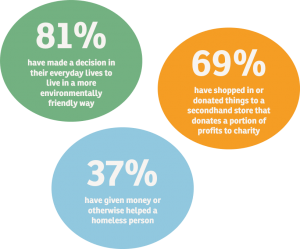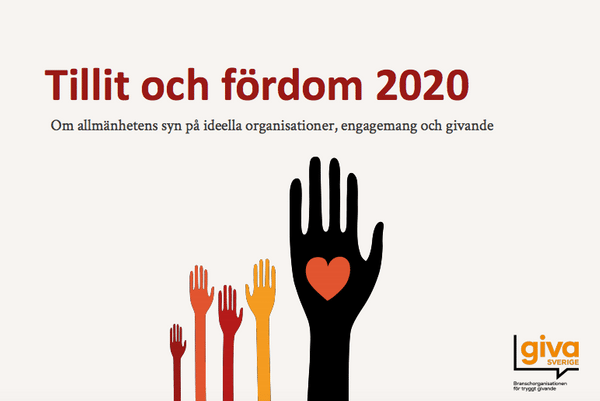
Legacy giving on the rise in Belgium
April 1, 2020
Irish give more to help the homeless than any other country
April 1, 2020People in Sweden are happy to contribute to society with a clear preference for causes close to them, Giva Sverige’s annual report into public attitudes towards non-profit organisations and donations has revealed.
For the first time, the report, entitled Trust and Prejudice 2020 – on the public’s view of non-profit organizations, commitment and giving saw Giva Sverige question the public about the charity objectives they consider most important as well as on their own involvement in charitable activity.
Overall, just under 8 out of 10 people have a positive attitude towards non-profit organisations, with 6 out of 10 believing that their own efforts also have a bearing on the way in which society develops. Nearly 6 out of 10 also believe that non-profit organisations’ projects or activities contribute to society, in line with previous years.
Medical research into serious illnesses is the top cause for Swedes, highlighted as very or quite important by 92%, followed by children’s causes (89%) and care for the elderly (87%) in Sweden. However, while the study shows a clear preference for charities working in the country, those who do give tend to perceive overseas operations as more important than non-donors do.
 In terms of their own engagement, reducing climate impact tops the list with 81% saying that they have made a decision in their everyday life to live in a more environmentally friendly way. 73% have also purchased an item that benefits a charity, and 69% have purchased in, or donated things to a charity shop.
In terms of their own engagement, reducing climate impact tops the list with 81% saying that they have made a decision in their everyday life to live in a more environmentally friendly way. 73% have also purchased an item that benefits a charity, and 69% have purchased in, or donated things to a charity shop.
Commitments that require an investment of one’s own time, such as voluntary work or involvement in cultural activities were less favoured however.
Overall the total amount donated has declined slightly, while the proportion of monthly donors remains constant. Almost 6 out of 10 questioned say they have donated in the past six months and of these, almost 50% state that they do so monthly. The findings also reveal that people who have given to charity are generally more committed in other ways as well.
Josefiina Ben Azzouz, Giva Sverige analyst, commented:
“This may be a sign that loyal donors have continued to give, while spontaneous donors have declined, and it is important that we keep following the development of this.”
Swedish payment app Swish continues to grow as a preferred payment method, while automatic recurring payments, such as direct debit, also remain popular. As in previous years, giving in conjunction with a funeral is the most common occasion for giving. Disasters and crisis situations also motivate giving, and the opportunity to donate in connection with their consumption is also appreciated by the donor.
Ben Azzouz added:
“This is the first time the public’s attitude towards the purposes of various organisations has been examined, and it’s going to be very interesting to follow this question over time, especially now when we are experiencing a pandemic. How will this affect the attitude towards different purposes?”




